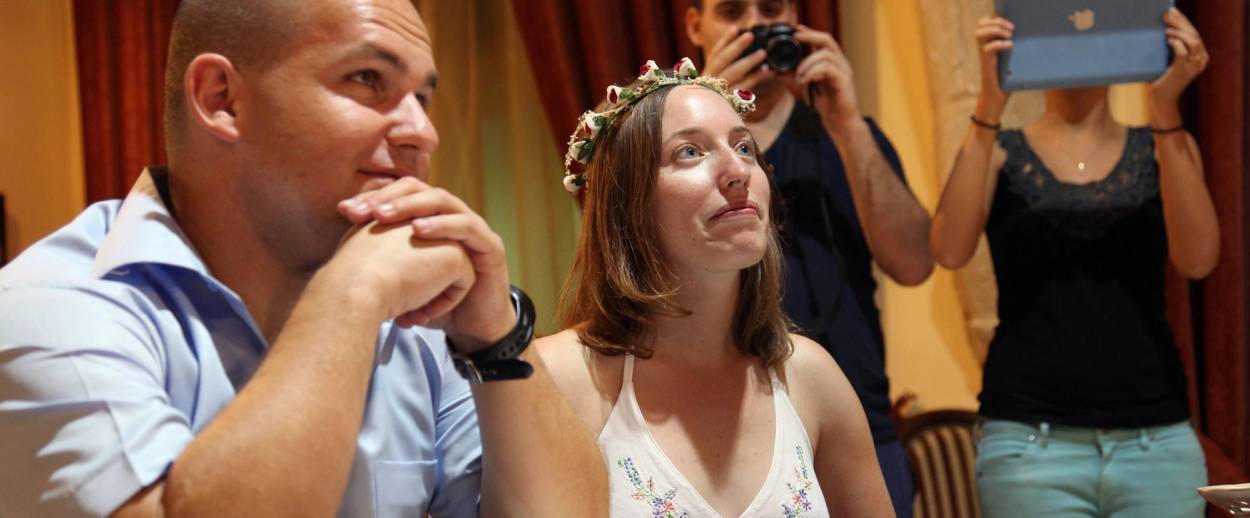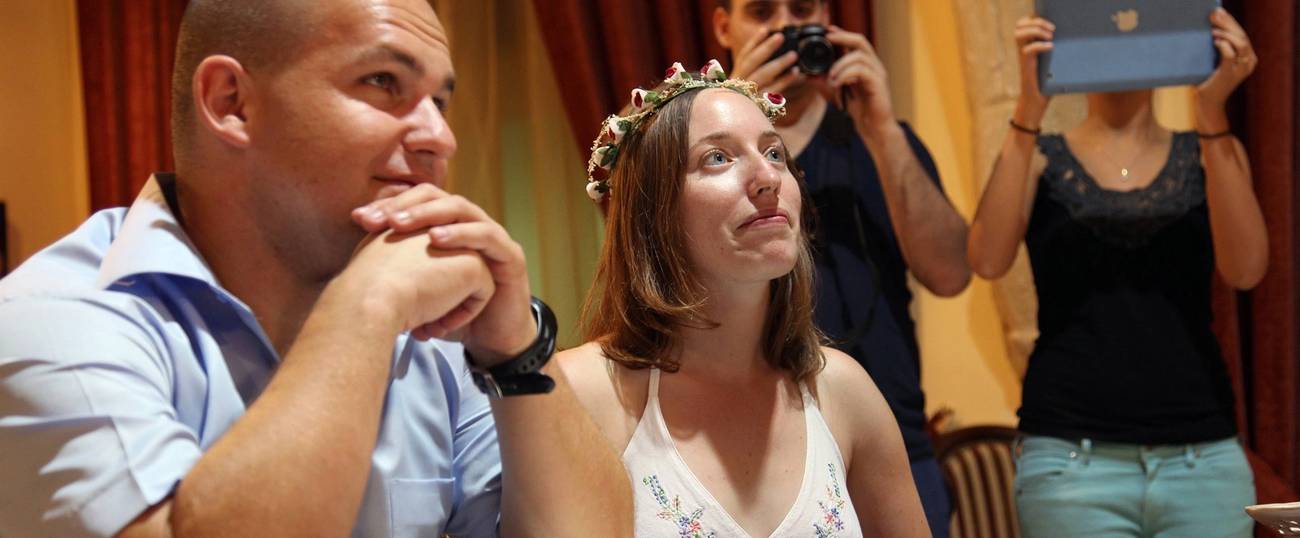Israel’s Undemocratic Marriage Laws
Overreach by Israel’s Rabbinate has turned marriage into a symbol of dissatisfaction with religious authority and a key issue in the upcoming election




When advocating for Israel, diaspora Jews take great pride in characterizing the Jewish state, cantankerous and messy as its politics may be, as the only democracy in the Middle East. In one significant measure, however, a Jewish minority is allowed to subvert the democratic will of a vast Jewish majority—that is when it comes to marriage laws.
The already contentious issue of marital choice, both important in its own right and as a symbol of larger issues around the domains of religion and state authority, has emerged as a potent issue in Israel’s upcoming election. Major parties on both the left and the right, including Blue and White, Yisrael Beiteinu, and the Democratic Camp, have declared they will introduce bills advocating for marriage freedom.
But the figure who has emerged as the hero in the fight for separation of state and religion is Avigdor Lieberman, that husky right-wing Moldovan and leader of Yisrael Beiteinu. In the last election in April, after Yisrael Beiteinu won five seats in the Knesset, enough to help form a right-wing majority, Lieberman decided to play spoiler and block Benjamin Netanyahu’s efforts to form a majority coalition. The refusal was ostensibly over the issue of a draft law exempting the Haredim from military service, which Netanyahu had backed and Lieberman strongly opposed. Faced with Lieberman’s rejection, Netanyahu was forced to dissolve the Knesset and call for new elections, set for September.
Rabbi Uri Regev is the director of Hiddush an Israeli NGO devoted to advocating for religious freedom and equality. According to Regev, some 600,000 Jewish Israelis are denied a religious wedding ceremony because their Jewishness is in question, according to the Rabbinate, Israel’s institutional body of rabbinic authority. This is an astounding figure, as it accounts for approximately 8.5% of the Jews in Israel. The number includes some 400,000 immigrants from the former Soviet Union who were deemed Jewish enough to be granted citizenship in Israel but insufficiently Jewish to be married beneath a chuppah in their new country. And they are hardly the only ones. On the long list of other groups who cannot receive the blessing of the Rabbinate there are: LGBTQ people, interfaith and binational families, some converts, immigrants, mamzerim (those born of halachically forbidden unions), migrants, and refugees.
Nor are the rules consistent over who counts as a Jew in Israel, and when. If a convert whose conversion was overseen by a non-Orthodox rabbi wishes to immigrate to Israel, this individual can make aliyah. Such a person, however, cannot marry. A gay couple cannot marry in what is otherwise a generally gay-friendly country. A Cohen—that is a person descended from the Kohanim, the Jewish priestly class—cannot marry a divorcee. Lately even Jews whose conversions were overseen by well-known modern Orthodox rabbis, such as Haskel Lookstein, Shlomo Riskin, and Nahum Rabinovitz, have had their Jewishness rejected by the Rabbinate.
Imagine this not uncommon scenario. A convert engaged to be married to the love of her life and her fiancé go before the Rabbinate to register only to find that for one reason or another they do not meet the standard of who is a Jew in the eyes of this institution.
As a result of Israel’s capricious religious bureaucracy, some couples choose to fly overseas for a quickie marriage in Cypus or, perhaps, Vegas. This allows them to return home with a marriage certificate to present to the Ministry of the Interior, which by law accepts their marriage, qualifying them for all of Israel’s marriage benefits. The couple married overseas also has the option, once they return to Israel, to celebrate their nuptials under a chuppah with all the rituals, down to the breaking of the glass with a Reform or a Masorti rabbi, or with no rabbi at all.
Those who have undergone a civil marriage who elect to divorce are required to create a Jewish divorce document, a get, the same as with a marriage under the auspices of the Rabbinate. Many find a get undesirable because it can only be initiated by the husband. A woman wishing to divorce cannot do so without the cooperation of her husband.
Lately, common law marriage has gained considerable traction in Israel. A couple wishing to marry in this manner signs a contract, essentially a prenuptial agreement that defines the terms of their living together as husband and wife. New Family, Israel’s leading family rights organization, directed by Irit Rosenblum, issues a card called a Domestic Union Card “to two adult partners of any gender, religion or nationality that meet the legal definition of common-law spouses in Israel.” The Israeli government and many private institutions recognize this card and a couple who has it gains benefits such as the ability to apply for a mortgage. These couples may avail themselves of the services of a rabbi and marry beneath a chuppah outside of the aegis of the Rabbinate. MARAM, the Israeli Council of Progressive Rabbis, recommends this procedure, in part because the dissolution of this marriage requires no get.
As the rules enforced by the Rabbinate have become more far-reaching, methods to circumvent the body’s power, once rare, have become increasingly popular. Many Reform and Masorti rabbis conduct marriages outside the strictures of the Rabbinate. In March of 2018, Rabbi Micky Boyden of Kehillat Yonatan, a Reform synagogue in Hod HaSharon, performed the wedding of Rotem Eizenkot and Omer Ben Chorin. This wedding stands out because Eizenkot is the daughter of General Gadi Eizenkot, the IDF chief of staff. That such a public figure would agree to support his daughter’s wedding in this manner serves as one indicator that marriage outside of the Rabbinate has become, if not normative, than at least very common and widely accepted.
According to a survey taken by Hiddush released on Aug. 13, 68% of the Israeli Jewish public favors a law that would allow freedom of choice in marriage. Only 19% of secular Israelis would elect to be married in an Orthodox ceremony were freedom of choice in marriage allowed. A vast majority of voters for non-Orthodox parties, including right-wing parties like Likud, support marital choice. A full 89% of the Israeli secular public supports changing the marriage laws to support choice.
The Rabbinate’s political power comes, not as a direct will of Israel’s democratic majority, but from the continual presence of religious Haredi parties in the ruling coalitions necessary to form a government. The ruling party has to offer a level of influence to the Haredi parties disproportionately large compared to their actual constituency, in order to keep them in the coalition and preserve the majority necessary to rule.
It’s this disjunction, between what most Israelis want and what the Rabbinate requires, that has made marriage such a touchstone political issue. It also helps explain why Lieberman has gained supporters, including from outside the right, because he’s come to be seen as a spokesman for the disenfranchised living in marital limbo. By opposing a coalition status quo in which, he argues, marriage is strangled, Haredim don’t join the army, transportation and other services are prohibited on Shabbat, and yeshivot receive some 1 billion shekels in assistance that could be better spent elsewhere, Lieberman has become a spokesman for a significant constituency.
On the campaign trail, Lieberman has made the overreach of religious authorities and their imposition on secular Israelis a defining aspect of his appeal. He has loudly advocated for what he calls a memshelet achdut liberalit and at times hilonit, a liberal, united (secular) government.
This is Israel and one never knows what will happen until the voters vote, but the poll numbers indicating extraordinarily wide support for change in the marriage situation suggest the issue isn’t going away any time soon.
***
Like this article? Sign up for our Daily Digest to get Tablet magazine’s new content in your inbox each morning.
Phil Cohen is the rabbi of Temple B’nai Israel in Albany, Georgia, and the author of Nick Bones Underground, due out in October.